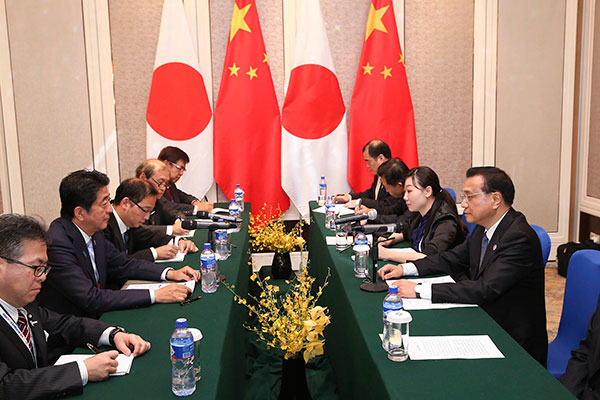Premier Li wins backing over South China Sea at ASEM Summit
(Xinhua) Updated: 2016-07-17 07:23Li's toughest remarks were directed at Japan, which, according to a Chinese diplomat that demanded anonymity, had sought in vain to include the arbitration case into the chair's statement of the summit.
Tokyo, not a state directly involved in the South China Sea issue, should thus stop hyping up and interfering in the South China Sea issue and "exercise caution in its own words and deeds," Li told Japanese Prime Minister Shinzo Abe in a Friday meeting at the latter's request.
China's stance on the issue is completely in line with international law and the DOC, Li said.
The Chinese premier's statements have been keenly received and won the backing from a number of Asian and European heavyweight leaders.
In the meeting with Li, Vietnam's Nguyen Xuan Phuc said his nation respects China's stance on the arbitration, adding that the disputes should be solved peacefully through negotiations.
Lao Prime Minister Thongloun Sisoulith said on the same day that Laos supports China's stance over the South China Sea issue, and stands ready to work with China to maintain peace and stability in the region.
Their words were echoed by Cambodian Prime Minister Hun Sen, who said on Friday that his country supports settlement of the South China Sea disputes through dialogue and consultation between countries directly concerned.
Russian Prime Minister Dmitry Medvedev also said Russia opposes the internationalization of the South China Sea disputes or any interference by the forces outside the region.
Russia supports China's principles on resolving the disputes, Medvedev said. He called for bilateral negotiations and consultations between directly relevant parties to solve the issue.
According to the anonymous Chinese diplomat, a vast number of countries "expressed understanding of China's stance in difference forms" and "accepted our stance on dispute settlement via dialogue and consultation."
"On the one hand, more and more countries have come to understand China's standpoints via extensive exchanges with the Chinese side," he said.
"On the other hand, the Nice attack had shed light on the importance of peace and stability," he added, referring to Thursday's truck attack in southern France that has claimed over 80 lives.
"We realize that the real threat in front of us is terrorism. There are neither wars nor conflicts in the South China Sea. Only a volatile South China Sea would threaten regional peace and stability," the diplomat noted. "Our 'friends circle' on the South China Sea issue seems to be getting bigger and bigger."





